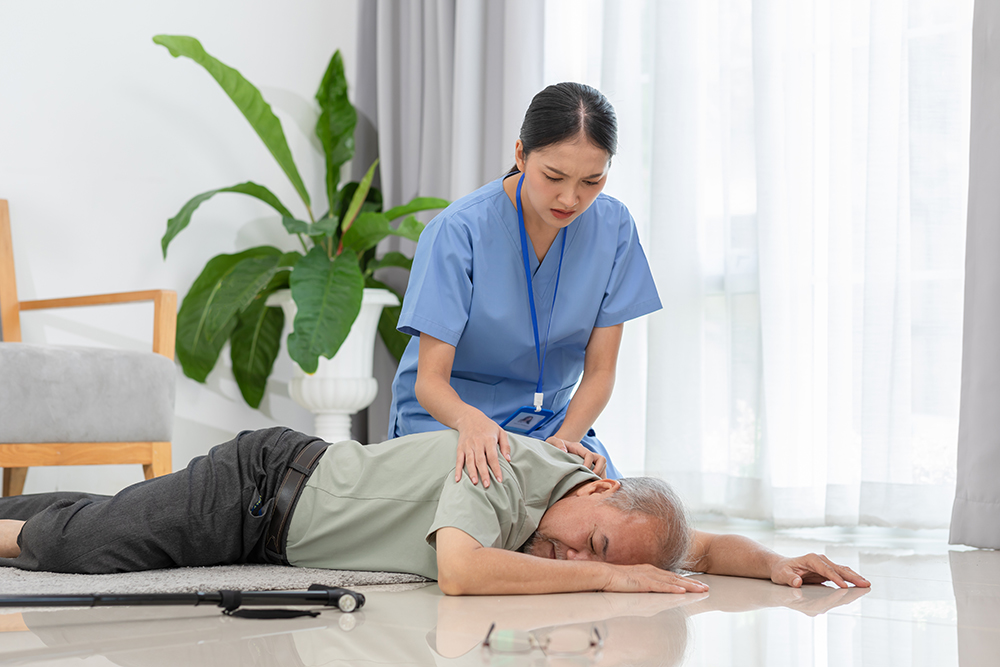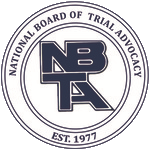
Statistics published by the Centers for Disease Control and Prevention (CDC) show that as much as 75% of nursing home residents experience falls annually in the United States. Falls like these can seriously injure elderly victims, causing them to suffer broken bones, head injuries, and other impairments that cause them to experience increased pain and restrict their already-limited mobility even more.
Many of these falls are completely preventable. Let’s explore why they happen and what can be done to prevent their occurrence so that you can take a proactive approach to minimize the chances of this affecting your nursing home resident loved one here in Lexington.
What Is a Fall Risk Assessment?
The CDC and the American Geriatric Society urge all assisted living or long-term care facilities and nursing homes to conduct fall risk assessments on residents aged 65 and over yearly. This population is most vulnerable to having balance issues, being medicated, or experiencing cognitive decline, more notable factors that increase their propensity to fall.
The first step in the fall risk assessment is for the medical provider or caregiver performing the test to ask questions about a nursing home resident’s history of falling, including how often this occurs, whether it’s resulted in injuries, and the circumstances under which it has happened (such as standing or walking). Residents who haven’t suffered any prior falls are considered at low risk for a future one.
Residents with a prior fall history must undergo further risk assessment exercises, including the Timed Up & Go, 30-second chair stand, and 4-stage balance tests. Individuals with no apparent balance, strength, or gait issues are also considered at low risk for future falls.
Kentucky nursing home residents that appear to struggle with gait, strength, or balance must be assessed further to determine how significant their fall risk is. How many prior falls they’ve experienced and whether they’ve resulted in injuries matters. If they’ve had zero, they may only be at moderate risk for a future fall. However, if they have had one or two falls before, their future fall risk may be moderate or severe.
Nursing homes should more closely monitor any nursing home resident who has a moderate fall risk. Assisted living facilities must keep a particularly close eye on high fall risk residents.
Why Do Falls in Nursing Homes Occur?
Falls primarily occur in Lexington, KY nursing homes because staff members at these facilities fail to adequately tend to residents, leading them to take matters into their own hands, including attempting to get up and move around, despite it not being safe for them to do so. Many instances in which staff neglect residents’ needs are attributable to inadequate staffing to handle residents’ needs.
Our nursing home abuse and neglect attorneys here at Golden Law Office have found the following to be reasons nursing home residents fall:
- Decreased mobility, which may encompass gait, balance, or muscle weakness issues or postural hypotension (drops in blood pressure that occur when someone moves from lying down or being seated to standing up) contributes to at least 24% of nursing home residents’ falls.
- As much as 27% of what are referred to as environmental factors also cause nursing home residents’ falls. Anything from dirty flooring to poorly fitted wheelchairs and a non-ideal bed height or poor lighting, resulting in visual acuity issues, may give way to falls.
Know that the scenarios described above account for more than 50% of nursing home residents’ falls and don’t have to happen. We’ll delve a bit deeper into how to prevent falls in nursing homes below.
When Are Nursing Room Falls Most Likely To Occur?
A prior study published by the National Institutes for Health (NIH) chronicled how 27% of nursing home resident falls happen between 4:00 and 8:00 p.m. That same data shows that residents are least likely to fall overnight, or between 11:00 p.m. and 7:00 a.m. Only 16% occur during that time of the day.
Is There a Way To Prevent Nursing Home Falls?
Nursing home residents’ falls are largely preventable. Some of the ways these falls can be avoided are by:
Treating Underlying Health Conditions
Our bodies tend to break down as we age, often making it necessary to use supportive devices for optimal functionality.
It can be beneficial for nursing home residents to undergo regular health evaluations to ensure they identify any hearing impairments or visual acuity issues, heart concerns such as arrhythmia, and also foot problems. It’s also important that residents receive regular care for chronic conditions.
Health care providers who fail to adequately screen residents, provide timely diagnoses, or administer appropriate treatments may face a medical malpractice lawsuit.
These health concerns can lead to falls among nursing home residents if left unaddressed.
Remaining Active
An estimated 24% of residents who fall in nursing homes do so because they have problems with their gait or muscle weakness (or the combination thereof).
The fall risk assessment test described above can help medical practitioners and caregivers identify deficits residents have that can make getting around safely challenging. Residents can attend gait, strength, and balance training programs, such as tai chi, to improve any functional impairments noted.
Assessing Supplementation and Drug Intake
Adjusting vitamin and supplement or prescription drug dosages can also improve a nursing home resident’s mobility, especially if it causes dizziness or balance issues.
Many doctors prescribe elderly patients psychotropic drugs to treat depression or anxiety or administer sedatives to help with sleep issues. Weaning off these can make it easier for residents to move about more safely.
In some cases, introducing certain supplements, such as Vitamin D, into an older person’s diet can help strengthen their bones, making them less vulnerable to experiencing a fall.
Addressing Environmental Hazards
As much as 27% of nursing home residents’ falls are attributable to environmental hazards. These hazards may include:
- Objects such as equipment left in hallways
- Debris-strewn or slippery flooring
- Curled up mats
- Electrical cords running across the floor
- Uneven or chipped flooring
Improving Staff Oversight
As mentioned above, many nursing home residents fall because of neglect. While it may have to do with understaffing, as previously suggested, it’s also attributable to having a poorly trained staff.
For example, in the case of a memory care type of nursing home facility that houses residents with Alzheimer’s or dementia, staff must be aware of how these conditions adversely impact those with the condition. Depending on the diagnosis and progression of their disease, a memory disorder patient may have difficulty eating, thus causing malnutrition issues. A resident may also be prone to wandering or elopement, leading them into unfamiliar environments (such as outdoors) where they may easily fall.
Staff members must be trained to be on the lookout for poor nutritional habits and be required to follow a safety protocol to minimize wandering to keep residents safe.
What To Do if Your Nursing Home Resident Loved One Suffered a Fall
Many families put their loved ones in the care of a nursing home with the expectation that the facility will take better care of them, given how such facilities are staffed 24/7. Nursing home staff may be overwhelmed or overworked and may not prioritize your loved one’s health and safety, leaving your loved one vulnerable to getting hurt in a fall.
Medical bills are likely to be high if your loved one suffers a fall at a nursing home. This is particularly the case if they suffer a broken bone requiring surgery to set it back in place or the fall results in a traumatic brain injury or spinal cord damage. It may additionally be necessary to move them to a better facility, which can come at a premium.
It can be helpful to consult with a nursing home abuse and neglect attorney to learn more about whether a Lexington assisted living facility’s treatment of your loved one violated Kentucky law. If your lawyer determines that it did, then you may be eligible to file a lawsuit against the nursing home on your relative’s behalf to recover damages such as medical expenses.
Statutes of limitations apply in nursing home abuse and neglect cases, so you’ll want to move forward in taking legal action quickly. This will ensure you can preserve any critical evidence necessary to prove liability in your loved one’s case. Schedule a no-risk consultation today to discuss how your relative’s nursing home could have done a better job of preventing a fall in a nursing home.





